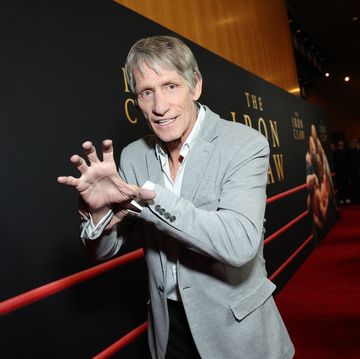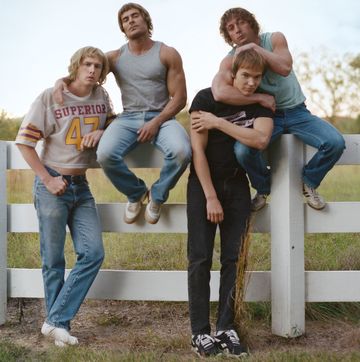Key Takeaways:
- Tech entrepreneur Whitney Wolfe Herd helped popularize Tinder as the dating app’s vice president of marketing.
- In 2014, she filed a sexual harassment lawsuit against the startup, left the company, and founded a competitor called Bumble.
- When Bumble became a public company in 2021, Wolfe Herd became the youngest female self-made billionaire at age 31.
The history of tech is littered with stories of founders who, after a schism with their company, swear up and down that they are going to rebound, to come back bigger and stronger with a brand new company that will give their former colleagues a run for their money. Most of those amount to nothing. Whitney Wolfe Herd actually did it.
The new movie Swiped, now streaming on Hulu and Disney+, stars actor Lily James as the pioneering tech founder who became the youngest female self-made billionaire and one of the main forces behind the dating app revolution. “Getting to step into her shoes and share her story—all the highs and the lows—was very, very meaningful and inspiring for me as a woman,” James said of taking on the role, according to Collider. Yet, James wasn’t unable to speak with the Bumble founder and former Tinder executive directly before stepping into her shoes. That’s because the story of Whitney Wolfe Herd didn’t just play out in the boardroom—it also reached the courtroom.
In 2012, when Whitney Wolfe was just 22 (and hadn’t yet added her married name Wolfe), she became involved with a startup called Cardify. The customer loyalty app was ultimately abandoned, but the driving force behind it, Sean Rad, developed another idea during a 48-hour hackathon. He conceived of a double opt-in dating app, then called Matchbox. It was eventually rebranded as Tinder, a name that Wolfe claims credit for.
“Tinder is brushwood that ignites a flame,” she told Grazia in 2016. Fellow co-founder Christopher Gulczynski designed the simple flame logo, then it was time to put the swipe-based dating app out into the world.
Getting the app out there was Wolfe’s primary responsibility. As Tinder’s vice president of marketing, she focused her attention on campus outreach, touring colleges around the country “to advertise the app with pizza parties and free thongs and flyers,” according to Time.
But as Tinder expanded into a phenomenon that revolutionized finding relationships, the interpersonal relationships within the Tinder offices were growing fraught. Per Time:
“One former Tinder employee recalls executives telling Wolfe Herd to ‘shut up,’ demanding she fetch breakfast and discussing her breast size in meetings when she wasn’t there. Another friend recalls that Wolfe Herd was ‘slut-shamed’ at the office and once had someone spit in her face at a party.”
Wolfe filed a sexual harassment lawsuit against Tinder in 2014. The case resulted in a settlement of $1 million plus stock but prohibited Wolfe from speaking about her experiences with the company.
In the wake of her lawsuit, Wolfe endured a torrent of online harassment. For some, that would be enough to make them turn their back on the tech world entirely. Wolfe saw it as a call to make things better. She originally set out to create a social networking site outside the dating space: a women-only social network under the name Merci, where users could give one another compliments. “No compliments on physicality,” she told Forbes. “Compliments about who they are.”
Around the same time, Andrey Andreev, founder of the dating app Badoo, reached out to Wolfe in the hopes of coaxing her to join Badoo as its chief marketing officer. She countered by proposing Merci to Andreev. While intrigued by the idea, Andreev suggesting bringing that energy to the dating app space. By combining Wolfe’s initiative with Andreev’s experience, infrastructure, and finances from Badoo, the intention was to launch a dating app that could circumvent the hostilities Wolfe had previously experienced online.
Andreev made a $10 million investment in the new company and took 79 percent ownership. Meanwhile, Wolfe retained the titles of founder and CEO as well as 20 percent ownership. The question now became how, specifically, this female-focused app would differentiate itself in the dating space.
“I always wanted to have a scenario where the guy didn’t have my number but I had his,” she told Forbes. “What if women make the first move, send the first message? And if they don’t, the match disappears after 24 hours, like in Cinderella, the pumpkin and the carriage? It’d be symbolic of a Sadie Hawkins dance—going after it, girls ask first. What if we could hardwire that into a product?”
With that, Bumble was born (Wolfe had originally hoped to call it Moxie, a name already taken by a different app). The dating app, which launched in December 2014, allowed women seeking heterosexual pairings to “make the first move.” By requiring them to message their potential suitors first, Bumble sought to cut down on the possibility of unsolicited inappropriate messages.
The app proved a success, enough that Wolfe was able to parlay Bumble not just into international markets, but also into spaces beyond dating. Bumble added Bumble BFF, which allows people to seek out platonic friendships, and Bumble Bizz, for those seeking professional connections, to the company portfolio.
In 2019, the parent company of Bumble, MagicLab, was sold to The Blackstone Group. Andreev relinquished his shares of both Bumble and Badoo, while Wolfe Herd was appointed the new CEO of MagicLab, with a 19 percent ownership of the company. Subsequently, Bumble replaced MagicLab as the parent company.
In February 2021, the decision was made for Bumble to go public via IPO. In its first week of trading, it’s share price reached a high of $78.89, and as a result, the 31-year-old founder became the youngest female self-made billionaire in the world.
That historic triumph would be a fitting end to the story all its own, but recent years have thrown a few more loops into this rollercoaster tech saga. In November 2023, it was reported that in the wake of Bumble’s stock price dropping more than 80 percent from that $78.89 height, Wolfe Herd was stepping down as CEO. She was replaced by Lidiane Jones, previously of the messaging platform Slack, the following January.
By January 2025, Wolfe Herd returned to her role as Bumble CEO after Jones left the company for personal reasons. Bumble’s stock is trading at $7.22 as of press time.
Michale Natale is a News Editor for the Hearst Enthusiast Group. As a writer and researcher, he has produced written and audio-visual content for more than fifteen years, spanning historical periods from the dawn of early man to the Golden Age of Hollywood. His stories for the Enthusiast Group have involved coordinating with organizations like the National Parks Service and the Secret Service, and travelling to notable historical sites and archaeological digs, from excavations of America’ earliest colonies to the former homes of Edgar Allan Poe.














